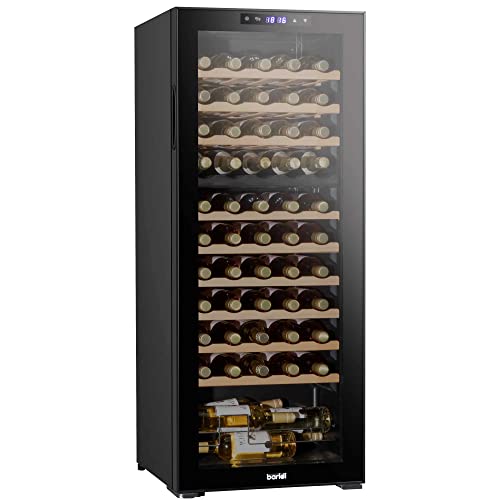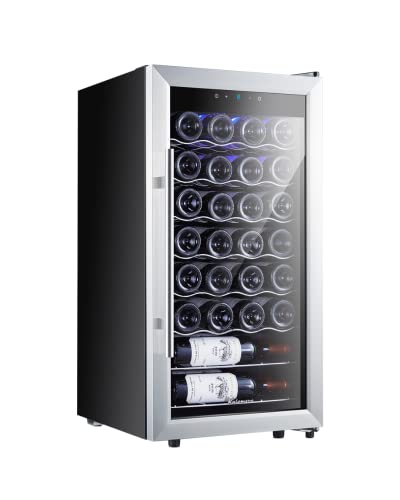10 Things Everybody Hates About Beer And Wine Refrigerator
페이지 정보
This dual-zone refrigerator is perfect to store and cool both wine and beer. It can be a freestanding unit or built-in, and features a seamless seamless door that can be placed in any space.
Although vibration is generally harmless but it can disrupt the sediment of a bottle and cause complex chemical reactions that aren't apparent. This can reduce the flavor and reduce esters over time.
Humidity Control
Humidity refers to the amount of water vapor that is present in the air. It fluctuates throughout the day due to various factors. Temperature, precipitation, wind and other environmental conditions can drastically affect humidity levels. Maintaining a healthy level of humidity is crucial for a variety of reasons. The humidity affects weather patterns as well as indoor air quality and wine storage. The delicate composition of a wine is made up of numerous aromatic compounds that are sensitive to changes in humidity. If humidity is excessively high, it could affect the balance of these substances and alter the taste of a wine. A wine refrigerator can help to maintain the right humidity level to preserve the wine's flavor.
A wine refrigerator can also prevent cork deterioration and ensure a proper seal. If the humidity is low, corks will dry out and allow oxygen to enter the bottle, which can accelerate the aging process and altering the wine's flavor. A wine refrigerator can help keep the humidity level between 55% and 75%.
While a wine cellar is designed for long-term aging, wine coolers can also offer excellent storage conditions for wines and beer. Many of them contain a space specifically for beer bottles, so you can store your favourite lagers and craft beers in the same location as your preferred wines. These units are designed to regulate temperature and humidity in order to avoid condensation, which can damage labels and packaging.
Most models have a hygrometer that allows you to monitor and adjust humidity levels in your wine cooler. You can also use an humidifier to increase the humidity inside your wine fridge.
If you choose to use a dehumidifier make sure it is set up in a separate area from the wine fridge. This will ensure that the dehumidifier will not absorb any of the beers or wines that you are storing in the fridge. If you plan to keep your wine for a long duration, controlling humidity is essential. For a brief period of time, you might not notice any changes in your wine fridge kitchen, however over months or years an absence of humidity can dramatically alter the flavor profile of your favorite wines.
Vibration Absorption
Vibrations inside the wine fridge may interfere with the natural aging process of stored wines. Even slight vibrations can cause an agitation of the sediment inside the bottle and trigger complex chemical reactions that reduce esters and dull the wine's flavor with time. All La Sommeliere units have a vibration absorption system that reduces vibrations and noise which allows your wine to age in peace and in a proper way.
Apart from the fact that wine coolers usually emit less sound than normal refrigerators, they are predisposed to noise issues because of the system of fans and refrigerant circuits that are found in the majority of units. It is crucial to adhere to the guidelines for clearance and put your wine cooler in a quiet space away from any other sources of noise.
In addition, it is recommended to clean your wine cooler using an agent that is non-abrasive and to allow the unit to "air out" before loading it with bottles. This will minimize the amount of dust and dirt that may accumulate in the air vents.
In the end, if you notice that your compact wine chiller fridge produces excessive noise, it may be due to an electric fan that is not working properly or compressor. The compressor is usually located behind the wine refrigerator. If it is placed in an unbalanced position or bumps into something behind it the rubber mounts could be shaken loose, which can cause loud humming sounds.
The compressor wine cooler operates similar to a regular fridge by compressing air molecules electronically, which reduces their temperature. Then, they are blown through the interior of your refrigerator. This type of cooling is more energy-efficient than other cooling methods, like frost-free or evaporator refrigerators. Compressor wine coolers are noisy and require more frequent maintenance. Because of this, many consumers opt to buy thermoelectric wine coolers that don't use compressor systems.
Temperature Control
Beer, like wine, requires specific temperatures to maintain its optimal flavor. This makes it crucial to select the right wine fridge and beverage refrigerator with temperature controls that can be adjusted to allow you to store your beverages at the ideal temperature for storage and serving for each type. Dual-zone models are available, which have separate temperature zones for beer and wine bottles.
In general, most beers are served cooler than wines. The ideal temperature for serving a particular type of beer will depend on the kind and the method used to make it. For example wheat beers and pilsners can be consumed between 40 and 50 degrees Fahrenheit while IPAs, sours and barleywines as well as stronger ales should be served at 50-55 degrees Fahrenheit. If you let a drink get too warm, it will create a sour "skunky" smell that can ruin the drinking experience.
When it comes to wine, you'll need to choose a refrigerator with an appropriate temperature range to accommodate your preferred whites, reds, and sparkling wines. Some wine refrigerators come with humidity-control features that help prevent the cork from becoming oxidized and keep it in good shape. Some models even have specialized UV glass to block sunlight, which helps maintain the wine's hue and protect it from premature aging.
The temperature control system in a refrigerator can be powered either by compressor or thermoelectric cooling. Compressor-powered units use the compression of vapors to reduce temperatures within the wine fridge and thermoelectric models depend on electronic convection fans that circulate cool air through the refrigerator. Most fridges use a combination of these technologies for the best results.
If you're planning to purchase a beverage or wine fridge that uses the compressor technology, you should look for one with shockpads that are vibration-resistant. This is because the rumble generated by compressor-based operations can disrupt the normal process of maturing wine and speed up the process of oxidation.
You can purchase a wine-specific refrigerator. However, it may be more cost-effective to purchase an ordinary fridge or a regular refrigerator that has a large interior and movable shelves. You can modify the space to fit a variety of bottles and cans, which include beer, wine and other drinks.
Storage Options
Consider a beverage cooler If you love hosting events. These refrigerators can be used to store bottles and cans of wine, beer and other drinks that are ice-cold such as soda and water. They're available in freestanding and built-in versions. A built-in model is integrated under counters or into cabinetry in kitchens with small space.
Both kinds of fridges are available in a broad range of sizes and designs, making them suitable for homes with a variety of. Choose models that have sliding shelves that allow you to quickly locate your favorite brews and vinos. Some refrigerators come with soft LED lighting that showcases your collection in a soft, gentle glow. Some models even come with a humidity control option. This feature can stop frost from forming in your wine and beer bottles so that you can enjoy them without worrying about it.
Dual-zone refrigerators can keep your wine at the perfect temperature for serving. You can also store craft beers in the two separate zones since it's at similar temperatures to bottles of cheap wine fridge, https://exactlybookmarks.Com,. A dual zone wine refrigerator can accommodate larger bottles of spirits or beer than a typical refrigerator.
The proper storage conditions can prolong the life of your beer and wine, so be sure that they are kept in a room that is well-ventilated and provides adequate light protection. The refrigerator should be free of dust, odors and other particles that could alter the taste of your beverages over time.
 If you're storing a large collection of wines and you want to preserve their quality, consider the cellar refrigerator. This kind of fridge is intended for long-term storage and serves at a slightly warmer temperature than a wine refrigerator, permitting your bottles to age at their optimal flavor. A cellar refrigerator also has an humidifier that keeps the right humidity level. This ensures that the cork is kept dry and inert, preventing external air and food items from entering your refrigerated wine bottle and deteriorating its quality over time.
If you're storing a large collection of wines and you want to preserve their quality, consider the cellar refrigerator. This kind of fridge is intended for long-term storage and serves at a slightly warmer temperature than a wine refrigerator, permitting your bottles to age at their optimal flavor. A cellar refrigerator also has an humidifier that keeps the right humidity level. This ensures that the cork is kept dry and inert, preventing external air and food items from entering your refrigerated wine bottle and deteriorating its quality over time.
- 이전글20 Things That Only The Most Devoted Coffee To Bean Machine Fans Know 24.10.17
- 다음글7 Small Changes That Will Make A Big Difference With Your Coffee Machines Beans 24.10.17
댓글목록
등록된 댓글이 없습니다.









